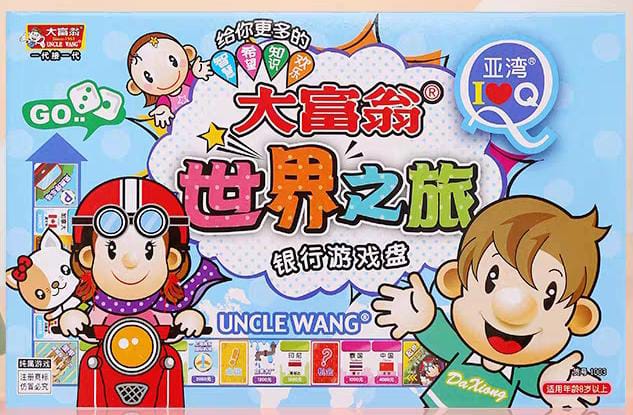Product Description
中文版:游戏介绍与详细玩法(“世界之旅 银行游戏盘 Q版”)
一、游戏简介
“Uncle Wang 大富翁 世界之旅 银行游戏盘 Q版”是一款以“环游世界”为主题、采用银行集中管理机制、画风为 Q 版(卡通可爱风格)的家庭桌游。玩家将以环球旅行为背景,购买各地地产/地标、收取租金、建设发展、与对手交易,目标是在游戏结束前积累最多资产或使其他玩家破产。
二、组件(一般情况)
-
棋盘:格子为世界各地著名国家/城市/地标(如巴黎、纽约、东京、伦敦等)
-
玩家棋子:每位玩家选一个标识
-
起始现金:每位玩家从“银行”获得统一金额(盒内标注)
-
地产卡/产权卡:对应棋盘上可购格子
-
建筑物标志(如房屋/旅馆)或升级标志(若规则支持)
-
机会卡/命运卡/事件卡:玩家落在相关格子抽取并执行
-
掷骰子或转盘:用以决定移动步数
-
银行角色:一名玩家担当银行家,负责现金、地产卡、拍卖等管理
-
说明书:规则说明、资产核算、胜利条件等
三、游戏目标
玩家通过投资地产、发展、收租金、参与交易并避免破产,使自己的资产(现金 + 地产 + 建筑)最大化。游戏结束条件通常为:只剩一名玩家未破产,或达成预设胜利资产目标/回合数。胜利者为资产最多或最后存活者。
四、游戏准备
-
将棋盘、现金、地产卡、事件卡、建筑物、棋子等组件摆放齐全。
-
每位玩家从银行领取起始资金。
-
地产卡与对应棋盘格子配对,置于银行待售区域或规则指定区。
-
指定一名玩家担任银行家,负责管理现金、地产卡、拍卖等。
-
每位玩家选择棋子并将其放置于“出发/Start”格。
五、游戏流程
按顺时针顺序轮流进行,每回合包括以下步骤:
-
掷骰子/使用转盘:玩家掷一或两颗骰子,或转动转盘决定移动的格数。若掷出双数,视版规可能获得额外回合。
-
移动棋子:根据点数将棋子移动到目标格子。
-
落格执行:
-
若落在未被购买的地产格:玩家可选择用现金购买。如放弃购买,则进入拍卖阶段,由银行家主持,其他玩家可竞价。
-
若落在他人拥有的地产格:需向该地产拥有者支付租金。租金数额根据地产类型、是否已建设建筑、是否拥有整组地产等情况而定。
-
若落在事件格/机会卡格:抽取事件卡或执行格子指示(可能获得现金、被罚款、移动、停一回合、抽卡等)。
-
-
发展机制:若玩家拥有一个颜色组(或按版本定义的地标组合)全部地产,并规则允许建设,则可在这些地产上建造建筑物或升级标志,以提升租金收益。
-
交易与资金管理:
-
玩家之间可互相交易地产、现金、卡牌。
-
若玩家资金不足支付租金或罚款,可将地产抵押给银行、出售建筑、或协商筹资。若仍无法偿付,则该玩家破产退出游戏,其资产按规则处理。
-
-
结束回合:玩家完成上述行动后结束回合。若玩家持有超过版规规定的现金、卡牌或地产数,需按规则调整/弃置。
-
胜利判断:当只剩一名玩家未破产,或达到预定胜利条件(如资产目标、回合数)时,游戏结束。胜利者为资产最多或最后存活的玩家。
六、Q版特点与备注
-
“Q版”画风通常更为卡通、简化,适合家庭、儿童或轻松娱乐。
-
世界之旅主题:地产使用世界各大城市或地标,使玩家感受环球旅行元素。
-
银行游戏盘机制强调“银行家”角色、拍卖流程、资金流动互动性强。
-
建议玩家人数:2‑6 人(具体以盒标为准);适合年龄约 6 岁以上;预计游戏时间约 20‑40 分钟(视版型而定)。
-
若说明书使用转盘代替骰子,则移动机制可能略有变化。
-
建议在初玩时先设定资产目标或回合数,以便控制游戏时长。
🇬🇧 English Version: Game Introduction & Detailed Rules (World Tour Bank Game Board Q‑Edition)
1. Game Overview
The “Uncle Wang Monopoly – World Tour Bank Game Board Q‑Edition” is a themed board game where players travel around world cities and landmarks, buying properties, collecting rent, building developments, trading assets and managing finances via a central bank system. The “Q‑Edition” suggests a cute, simplified design suitable for families and children.
2. Components (Typical)
-
Game board: squares representing various global cities or landmarks.
-
Player tokens: one token per player.
-
Starting cash: each player receives equal amount from the bank.
-
Property Title Deed cards: correspond to purchaseable squares on the board.
-
Building tokens (houses/hotels) or upgrade markers (if building mechanics included).
-
Chance/Event cards: triggered when landing on special squares.
-
Dice or spinner: determines movement steps.
-
Banker role: one player acts as banker managing funds, auctions and transactions.
-
Rulebook.
3. Objective
By acquiring properties, developing them, collecting rent, trading and avoiding bankruptcy, players aim to maximize their total assets (cash + properties + buildings). The winner is the player with the highest assets at game end, or the last remaining solvent player.
4. Setup
-
Prepare all cash, property cards, event cards, building pieces and player tokens.
-
Each player receives equal starting cash from the bank.
-
Shuffle event cards and place them in designated area.
-
Assign one player as Banker to manage money, property transactions and auctions.
-
Each player places their token on the “Start” square.
5. Gameplay
Players take turns in clockwise order. On a player’s turn:
-
Roll dice / spin spinner to determine how many spaces to move.
-
Rolling doubles may grant an extra turn (if version allows).
-
-
Move your token accordingly on the board.
-
Landing action:
-
If landing on an unowned property: you may buy it from the bank; if you decline, it is auctioned among all players by the banker.
-
If landing on a property owned by another player: you pay rent to that player (rent may be higher if buildings are present).
-
If landing on a special square (Chance/Event/Tax/Jail etc): draw an event card or follow instructions (gain cash, pay, move, skip turn etc).
-
-
If you own all properties of a colour set (or defined group for this edition), you may build houses/hotels (if rules allow) to increase rent.
-
Players may trade properties and cash among themselves at any time (or as permitted by rules).
-
If you cannot pay rent or fines: you may mortgage properties, sell buildings or negotiate with other players; if still unable to pay, you are bankrupt and exit the game.
-
End your turn; if you hold more assets/cards than permitted, adjust accordingly.
-
Winning: The game ends when only one player remains solvent or when a preset condition is met; richest remaining player wins.
6. Q‑Edition Specific Notes
-
The Q‑Edition features simplified gameplay, family‑friendly visuals and possibly fewer property sets or simplified building rules.
-
The Bank Game Board format emphasizes centralized banking, auctions and financial decision‑making.
-
The World Tour theme uses global cities/landmarks for properties, adding a travel flavour.
-
Typical players: 2–6; recommended age: approx 6+; estimated play time: ~20‑40 minutes depending on version.
-
Check the box for variant features: e.g., spinner instead of dice, simplified building mechanism, or themed event cards.







Reviews
There are no reviews yet.